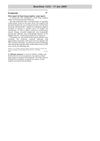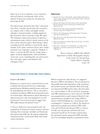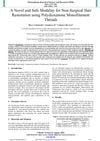 14 citations,
April 2019 in “International Journal of Women's Health”
14 citations,
April 2019 in “International Journal of Women's Health” Some treatments can stabilize Frontal Fibrosing Alopecia, but more research is needed to find effective treatments, and hair transplants often fail.
 10 citations,
June 2000 in “Primary Care”
10 citations,
June 2000 in “Primary Care” The document explains different hair loss types and treatments, emphasizing diagnosis through examination and tests, and specific treatments for each condition.
 8 citations,
October 2018 in “Journal of The American Academy of Dermatology”
8 citations,
October 2018 in “Journal of The American Academy of Dermatology” The review suggests there's no agreed treatment for Frontal Fibrosing Alopecia, but hydroxychloroquine and 5a-reductase inhibitors are most effective. New treatments like platelet-rich plasma and LED light could help if standard treatments fail.
6 citations,
July 2018 in “PubMed” The treatment is safe and very effective for hair growth in Asian men with minimal side effects.
 4 citations,
July 2021 in “Dermatology and therapy”
4 citations,
July 2021 in “Dermatology and therapy” Hormone therapy increases facial and body hair in transgender men, while hair removal improves well-being in transgender women, but cost is a barrier as insurance often doesn't cover it. Dermatologists can use various treatments for these hair issues.
 1 citations,
October 2013 in “Actas Dermo-Sifiliográficas”
1 citations,
October 2013 in “Actas Dermo-Sifiliográficas” Customized medications made through compounding can be beneficial for various skin conditions but require careful regulation and collaboration between doctors and pharmacists.
 December 2023 in “Farmateka”
December 2023 in “Farmateka” Minoxidil is an effective and safe treatment for common hair loss when applied to the skin, but more research is needed for optimal use.
 May 2023 in “Journal of Clinical Medicine”
May 2023 in “Journal of Clinical Medicine” New understanding and treatments for hair loss are improving, but more research is needed.
 August 2021 in “Case Reports”
August 2021 in “Case Reports” A woman thought to have rosacea was actually suffering from Frontal Fibrosing Alopecia, a hair loss condition. Despite treatment, her condition didn't change, showing the importance of accurate early diagnosis.
 April 2021 in “Advances in Cosmetic Surgery”
April 2021 in “Advances in Cosmetic Surgery” Hair restoration can be achieved through non-surgical treatments like minoxidil, antiandrogens, phototherapy, and PRP procedures, or through surgical methods like hair transplantation. Continued treatment is needed to maintain results, and full results are visible after 12-18 months.
 January 2017 in “Clinical approaches and procedures in cosmetic dermatology”
January 2017 in “Clinical approaches and procedures in cosmetic dermatology” Men are increasingly seeking quick-result cosmetic treatments for their thicker, oilier skin and hair loss issues.

Hormonal treatments can help with hair loss, acne, and excess hair growth, but it takes 3-6 months to see results and patients should know the possible side effects.
 January 2009 in “Reactions Weekly”
January 2009 in “Reactions Weekly” A man had an allergic skin reaction on his penis from a hair loss medication, which improved after stopping the medication.
January 2023 in “Dermatologic Therapy” Intralesional corticosteroids and 5-alpha-reductase inhibitors are the best treatments for frontal fibrosing alopecia.
 April 2021 in “Journal of The European Academy of Dermatology and Venereology”
April 2021 in “Journal of The European Academy of Dermatology and Venereology” Age, hair loss duration, menopause, and specific treatments affect hair density and caliber in female hair loss patients.
 20 citations,
April 2006 in “Dermatologic Clinics”
20 citations,
April 2006 in “Dermatologic Clinics” Antiandrogen therapies are beneficial for treating skin and hair conditions related to androgen levels.
 June 2024 in “Journal of cosmetic dermatology”
June 2024 in “Journal of cosmetic dermatology” Dutasteride is the most studied alternative drug for androgenetic alopecia, but more high-quality research is needed.
 August 2023 in “Journal of The American Academy of Dermatology”
August 2023 in “Journal of The American Academy of Dermatology” New treatments for hair loss include low-dose pills, updated drugs, supplements, light therapy, plasma injections, and advanced hair transplant techniques.
 August 2018 in “Journal of The American Academy of Dermatology”
August 2018 in “Journal of The American Academy of Dermatology” Different treatments for skin conditions were found to be effective and generally safe, with biologics recommended as the first choice for generalized pustular psoriasis.
 36 citations,
December 2012 in “Dermatologic Surgery”
36 citations,
December 2012 in “Dermatologic Surgery” Injecting platelet-rich plasma (PRP) can increase hair growth rate and density in male pattern baldness.
26 citations,
October 2017 in “PubMed” Isotretinoin and acitretin may effectively stabilize the hairline in patients with frontal fibrosing alopecia.
 4 citations,
April 2021 in “Journal of Cosmetic Dermatology”
4 citations,
April 2021 in “Journal of Cosmetic Dermatology” Botulinum toxin may help hair loss by increasing blood flow and reducing harmful factors.
 2 citations,
September 2013 in “Journal of Cosmetic Dermatology”
2 citations,
September 2013 in “Journal of Cosmetic Dermatology” Hair restoration combines drugs and follicular unit grafting for natural, long-lasting results.
 1 citations,
April 2017 in “Drugs & Therapy Perspectives”
1 citations,
April 2017 in “Drugs & Therapy Perspectives” Use antiandrogens and other treatments for hair loss.
 August 2024 in “International Journal of Science and Research (IJSR)”
August 2024 in “International Journal of Science and Research (IJSR)” PDO threads are effective and safe for non-surgical hair restoration.
 July 2024 in “Forum Dermatologicum”
July 2024 in “Forum Dermatologicum” Topical treatments for hair loss can be effective but need careful safety evaluation.
 April 2024 in “Expert opinion on emerging drugs”
April 2024 in “Expert opinion on emerging drugs” New treatments for male hair loss are being explored to improve effectiveness and reduce side effects.

There are many treatments for common hair loss, but more trials are needed to decide which are best.
Alternative treatments with nutrients, minerals, and vitamins are being explored for safer hair loss management.
 September 2017 in “Clinical and Experimental Dermatology”
September 2017 in “Clinical and Experimental Dermatology” The document summarized various dermatology studies and case reports.


























